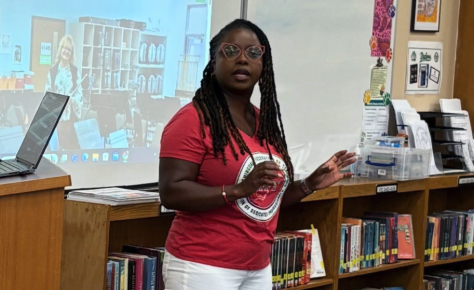Here were are in the eleventh month of 2020. We made it. COVID-19 brought and continues to bring illness and death of loved ones and friends. School closings brought separation, disconnectedness, and isolation. The murders of Ahmaud Arbery, Breonna Taylor, and George Floyd highlighted the continued unearned privilege and systemic racism in our country. The return to work brought the craziness of remote and in person teaching, technological frustration, teaching with masks and shields, fear of infection, and a level of stress that we have never seen before. Then there was the lead up and outcome of the presidential election. We know the consequences of elections and this one was highlighted a disunity that some have never seen before. So whether it is our own personal stress, the stress of our students' lives as they bring their complicated feelings about their personal trauma into our virtual, or in person classrooms, it is okay not to be okay all the time.
None of the things I just mentioned should have had to happen, should not be and cannot be, a 'new normal'. None of this should we even have to pretend is normal. Many of us are still reeling from our own trauma and now we are dealing with what has been termed 'secondary trauma, or compassion fatigue'. It is okay to feel frustrated and exhausted. We are trying our best to adapt during a time of uncertainty. The US Department of Heath and Human Services (HHS) defines secondary trauma as a set of observable reactions working with people who have been traumatized. School staff, now deemed essential workers, are already feeling burnout before even a third of of the school year is complete. I see and hear it daily. Things that we would have let roll off our backs are now the last straw that we cannot bear any further. I saw a tweet that reinforced this it said "Dear Teachers, You are not the corner store, the Circle K, or the 7-Eleven. You are not open 24 hours a day. Put up boundaries and stop answering emails, calls, and texts after a certain time. Protect your time, your spirit and your brainpower. You can do it". We are humans, we can only do so much. In the October issue of NEA Today they recommend some strategies for staying mentally healthy in these difficult times, I've added some thoughts of my own next to each one:
- Make self-care a non negotiable (make exceptions only when necessary)
- Stay connected to others (support your colleagues)
- Reframe negative thoughts (try a positive outlook)
- Show yourself grace and compassion (take care of yourself)
- Ask for help (help is available)
When I read these things I knew that it was written with me in mind, and that I would have to share it with you. Whether your stress is building up from the state of disunity in our country, everything stemming from living in a pandemic, family concerns, or health issues just know self care doesn't mean your selfish. Staying connected doesn't mean you can't ignore some people to regain your mental health. Reframing negative thoughts doesn't mean glossing over things or faking toxic positivity. Over and over I am reminded that giving yourself grace doesn't mean you may not have days when you feel like screaming. Asking for help is SO DIFFICULT for some of us, even if you are asking family and friends.
Sometimes it's easier to ask your favorite coworker to lend an ear or a shoulder. It's OK! If you are feeling mentally fragile though and need to seek professional support please do so. You are worth it. One place you can reach out to for all kinds of help and resources as a NYSUT member is NYSUT social services. Contact Social Services: Call 518-732-6239, or email them at socialservices@nysut.org.
Stay safe and I hope everyone has a Happy Thanksgiving.



